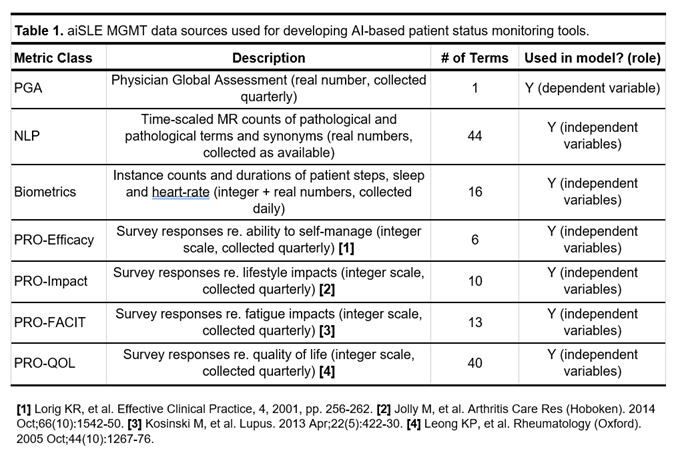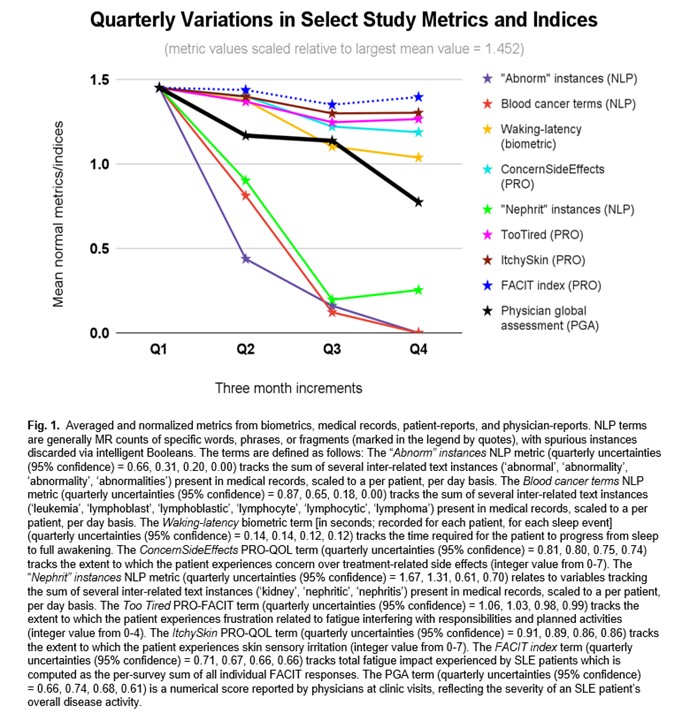Session Information
Session Type: Poster Session A
Session Time: 10:30AM-12:30PM
Background/Purpose: Systemic lupus erythematosus (SLE) is one of several rheumatologic disorders that presents frequent healthcare challenges, particularly for socioeconomic and geographically disadvantaged patients. Due to a shortage of rheumatologists, frequent in-person clinical evaluations to optimally manage SLE can be difficult to achieve. This study seeks to determine the potential utility of patient biometric and self-reported data in combination with natural language processing (NLP) extracted medical records (MR) as surrogate measures for physician global assessment (PGA).
Methods: We report results of a prospective study at five rheumatology clinics with 45 of 50 recruited participants completing follow up for 12 months post enrollment. This crossover study introduced a biomarker and digital management platform starting in month four. For analyses, patient biometric and self-reported measures were combined with extracted MR data. Using PGA data recorded every 90 days as a training target, cross-correlation and covariance analyses were employed to identify relationships between MR data identified by NLP, patient-reported outcome surveys (PRO; completed every 90 days), and biometrics (sleep, heart rate and activity data recorded daily), Table 1. PGA scores and MR (via NLP) data were compared to identify potential medical evaluations that reflected SLE-associated physician assessments. PRO and biometric terms were compiled concurrently for inclusion in deep learning models aimed at predicting/characterizing patient outcomes. Statistical analysis, cross-validation, and computational modeling were performed using Python statistical, machine learning, and deep learning libraries.
Results: PRO composite indices for patient fatigue (FACIT) and quality of life (QOL) had moderate correlations (0.48< R< 0.60; R=Pearson product moment correlations; 95% confidence interval (CI) [0.21-0.76]) with PGA. Among specific metrics, strong PGA correlations (R >0.80; 95% CI for R lower bound [0.66-0.89]) were established with select NLP terms reflecting possible SLE associated disease activity and co-morbidities (discussions of general abnormalities, cardiopulmonary dysfunction, concern over blood cancers), improving wake-up latency, and other improved symptoms reflected in numerous PRO impacts (drug side-effect concerns, itchy skin, morning fatigue, etc.), Fig 1. Collectively, 24 diverse metrics with statistically significant relationships to PGA trends characterized the health status of remote patients; an additional 26 terms provided plausible influences (R >0.70 vs. PGA; 95% CI for R lower bound [0.51-0.83]) for feature selection and principal component analysis that augmented AI models reflecting possible SLE-associated disease activity and co-morbidities.
Conclusion: These results indicate the combination of biometric and PROs alongside clinical evaluation may inform a remotely administered SLE disease management program to improve continuity of care and outcomes. Additional studies are needed to determine the impact of such a management program on treatment compliance, disease activity and flare, and long-term outcomes.
To cite this abstract in AMA style:
Lushington G, Wang B, Purushothaman M, Munroe M, Nadipelli V, Rubin B, Crawley J, Valashinas B, Khan R, Warrier A, Huffstutter J, Murphy J, Santamaria L, Nair S, Armstrong G, Nair S, DeFreese D, Holloway A, Sorathia A, Adelman B, Pautasso F, Jupe E. Medical Record Natural Language Processing and Patient Biometric and Self-Reported Measures Inform an Artificial Intelligence Augmented Remote Care Management Strategy for Lupus Patients [abstract]. Arthritis Rheumatol. 2024; 76 (suppl 9). https://acrabstracts.org/abstract/medical-record-natural-language-processing-and-patient-biometric-and-self-reported-measures-inform-an-artificial-intelligence-augmented-remote-care-management-strategy-for-lupus-patients/. Accessed .« Back to ACR Convergence 2024
ACR Meeting Abstracts - https://acrabstracts.org/abstract/medical-record-natural-language-processing-and-patient-biometric-and-self-reported-measures-inform-an-artificial-intelligence-augmented-remote-care-management-strategy-for-lupus-patients/


